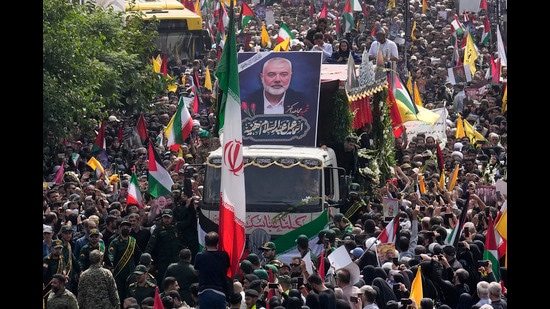Aug 13, 2024 09:22 PM IST
Iran’s threat of retaliation and Israel’s continued brinkmanship could derail talks set to begin again on Thursday
A possible Iranian retaliation against Israel for the killing of Hamas and Hezbollah leaders could have severe ramifications for negotiations on a ceasefire in Gaza that are expected to resume on Thursday. Iran has already dismissed a call by France, Germany, and the UK not to go ahead with its threat, adding to concerns about an escalation of the Israel-Hamas conflict that began more than ten months ago. Egypt, Qatar and the US, which have been mediating the discussions between Hamas and Israel, have indicated they intend to present a “final bridging proposal” at the upcoming negotiations to reach a ceasefire in Gaza, where the death toll is inching towards 40,000 though several studies have pointed to a much higher figure. It is against this backdrop that the leaders of France, Germany, Italy, the UK and the US issued a joint appeal on Monday that called on Iran to “stand down” its threats of a military attack against Israel and highlighted the “serious consequences for regional security” arising from such a strike. However, the leaders also pledged their support for Israel against Iranian aggression.

The Iranian leadership clearly faces a dilemma; if it gives in to this appeal, it will be perceived as weak, especially after the bombing in Tehran that killed Hamas leader Ismail Haniyeh at a time when he was a guest of the Iranian State at the inauguration of President Masoud Pezeshkian. A strong response against Israel could set in motion events that can lead to a rapid escalation of the conflict. Key western powers such as the US and Germany are perceived as enablers of Israel’s immoral onslaught in Gaza, and their position in the current imbroglio has led to frequent accusations of double standards. At the same time, the upcoming negotiations too are under a cloud as both Hamas and Israel have doubled down on their original positions, which resulted in a deadlock in the last few rounds of talks. Some in the Israeli leadership are even attempting to portray this as Hamas’s reluctance to agree to a ceasefire. It is now becoming clear that the ceasefire negotiations are being stymied and jeopardised by PM Benjamin Netanyahu, whose government continues to engage in provocative actions, ranging from the relentless bombardment of civilians in Gaza to assassination, and the West must do more to convince him to back down and instead work towards a peaceful solution.
Unlock a world of Benefits with HT! From insightful newsletters to real-time news alerts and a personalized news feed – it’s all here, just a click away! –Login Now!


